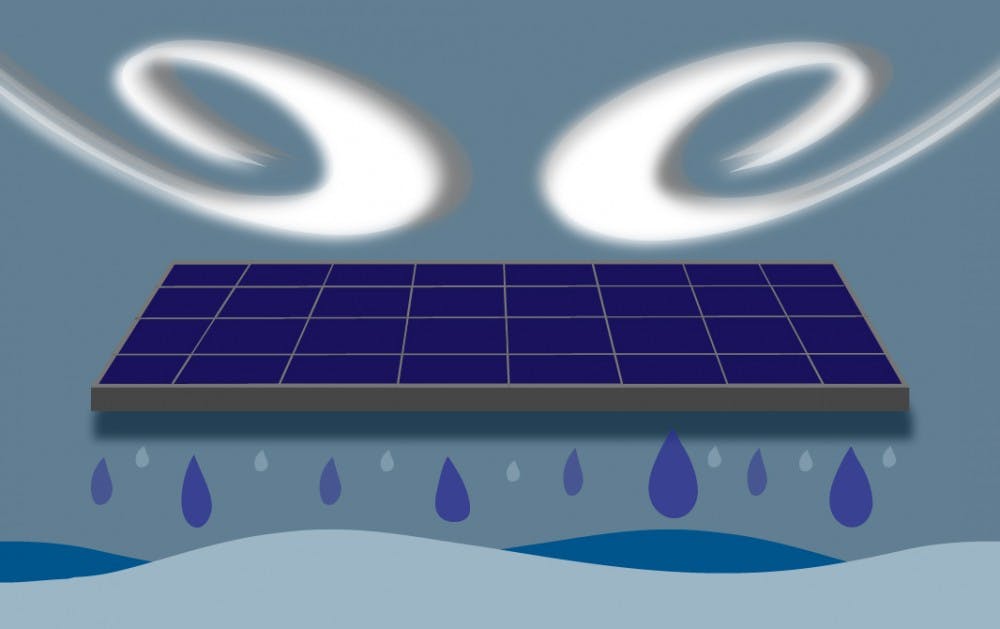Last month, ASU associate professor at the School for Engineering of Matter, Transport and Energy Cody Friesen won a prestigious $500,000 Lemelson-MIT Prize for his Scottsdale-based company, Zero Mass Water.
According to its website, the Lemelson-MIT Prize is an award given annually to “honor outstanding mid-career inventors dedicated to improving our world through technological invention.”
Zero Mass Water is a company that aims to create renewable water using sunlight and air alone.
"Our vision is to perfect water for every person in every place," said Kaitlyn Fitzgerald, director of brand at Zero Mass Water.
Instead of keeping the prize money, the company donated it to a community in Colombia to further its efforts abroad of supplying underserved communities with clean drinking water.
“As inventors, we have a responsibility to ensure our technology serves all of humanity, not simply the elite", said Friesen in a statement on The Lemelson Foundation website. “At the end of the day, our work is about impact and this recognition propels us forward as we deploy SOURCE Hydropanels to change the human relationship to water across the globe.”
The SOURCE Hydropanels that Zero Mass Water utilizes are able to work in some of the driest, most arid regions of the world, showing why the company was recognized by Lemelson-MIT for its innovation and is able to operate around the globe.
“We’re able to make water in very arid places like here in Arizona as well as in Bali (Indonesia). The technology works to serve for the people who rely on it everywhere it is installed,” said Fitzgerald.
The hydropanels installed by Zero Mass Water are “fully solar powered” and work by “raising the temperature inside each hydropanel and absorbing the water vapor in the ambient air all around it onto a material … that attracts pure water molecules,” said Fitzgerald.
Zero Mass Water has implemented its hydropanels in “more than 30 different countries, and [has] partners all over the world that support reaching communities and individuals working to perfect their water,” Fitzgerald said.
One of those partners is ASU, which worked together with Zero Mass Water and the United States Agency for International Development (USAID) on a project in 2017 aiming to provide potable water to refugee host communities in Lebanon and Jordan.
Jason Franz, manager of marketing and communication at the ASU Rob and Melani Walton Sustainability Solutions Service detailed how the University and Zero Mass Water were able to work together on this project, as they first collaborated and shared ideas at a USAID workshop in Germany.
“Zero Mass Water was there as a participant representing its own corporate interests,” but ASU and Friesen’s company collaborated on ideas until they, alongside several other organizations, came up with a comprehensive plan for the crisis in Lebanon and Jordan, Franz said.
Their combined plan aimed to “harvest clean drinking water in remote areas and regions,” as well as “provide the opportunity to specifically women to get employment and training opportunities that they wouldn’t normally have.”
The two-year long USAID initiative cost nearly $2 million and, “all came together so that we were able to install these solar panels, train the people, and collect and harvest the water so that the people will have the access that they needed,” Franz said.
At the end of the two years, the collaborative effort was a success with 36,000 people gaining access to affordable clean water, 129 people trained and 126 Zero Mass Water panels installed, according to an ASU database provided by Franz.
The effort that ASU and Zero Mass Water underwent in order to help the refugees in the Middle East is no surprise given the University’s efforts to ensure water efficiency at all times.
In 2017, the ASU Student Pavilion was completed with a comprehensive Zero Waste goal that provided water efficiency standards which included efficient air conditioning units designed to capture excess condensation for plant watering and rainwater for irrigation.
Jeffrey Rensel, director of operations and events at the Memorial Union, affirmed that “there is intentionality in the future” for all buildings to become water efficient, similar to the Student Pavilion.
Ambitious water efficiency goals are not met easily either at ASU or abroad, but can be achieved through consistent and focused efforts.
"We absolutely had many challenges on the way and many things we had to learn," Franz said, "but the application of the technologies from all of the parties worked as anticipated.”
Going forward, Zero Mass Water will continue to seek out opportunities to aid underserved communities internationally through collaborative projects.
" ... We have partners all over the world that support us reaching communities and individuals working to perfect their water and solve the world’s water crisis."
Reach the reporter at baharr21@asu.edu or follow @bharris823 on Twitter.
Like The State Press on Facebook and follow @statepress on Twitter.




